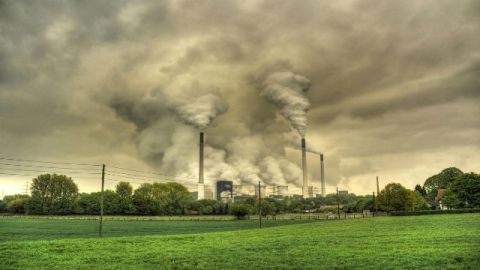The Depressing Reality in Supposedly Good News on Climate Change

Proposed U.S government regulations to curtail carbon dioxide emissions from power plants are rightfully being hailed as major progress in the fight against climate change. Major environmental groups are applauding. Former Vice President Al Gore called the draft regulations “the most important step taken to combat the climate crisis in our country’s history.” The head of the World Resources Institute called them “momentous”. But this bit of encouraging progress may be more symbol than substance, and symbolism has zero impact on climate chemistry. Indeed these proposals would physically accomplish so little that, symbolically, they may represent bad news more than good.
Though they certainly represent dramatic cuts, the draft proposals to reduce CO2 emissions from power plants by 30% over 2005 levels by the year 2030 don’t amount to much in the big picture. Yes, these cuts will eliminate a huge amount of greenhouse gas emissions (and lots of other ‘local’ air pollutants, which may well have greater benefits for human health), 500 million metric tons per year by 2030. That sounds like a big number. But the power sector in the U.S. is only responsible for 40% of the country’s emissions, so this so-called major progress will in fact reduce U.S. CO2 emissions only a little more than 10%, and it will take more than 15 years to do even that little. And remember, as big an emitter of greenhouse gasses as the U.S. may be, the climate is global and U.S. fossil fuel power generation produces just 6% of the world’s carbon dioxide emissions. So this cut will only be a small slice of that small slice (10% of 6%) of the global CO2 emissions that are contributing to climate change.
Now compare those reductions against the 40-70% global reductions (over 2010 levels) that the Intergovernmental Panel on Climate Change Working Group Three recently identified as necessary just to have a 66% shot at keeping average global temperatures from rising much past 2 degrees celsius/3.5 degrees fahrenheit, the point beyond which the IPCC says the harms from climate change get far more severe.
Still, these draft regulations are a huge step. Lots of other nations have said they won’t act until the U.S. does. Well now the U.S. has, not only with this step, but with the way the Obama Administration twisted the arms of vehicle makers that needed bail outs in 2008, getting them to agree to dramatic increases in fuel economy which will eliminate more CO2 emissions (over the lifetime of the vehicle fleet – average about ten years) than the power plant regulations would.
It is also a cause for optimism that the U.S. has acted unilaterally. Gone are the pipe dreams of some grand international accord between the rich and developing nations of the world, which most realists accepted, even before Kyoto, was never going to happen. Modeling unilateral action this way sets an important international precedent leading up to the 21st U.N. Climate Change Conference next year in Paris.
But those symbolic positives don’t overcome the larger negative, that these draft proposals, the best America can do, don’t physically do much. In fact, if these supposedly monumental developments are the best we can do, the relatively meager accomplishments of this supposedly “momentous step” might fairly be called not a positive development, but a downright discouraging sign of where we stand in the struggle to deal with nothing less than a serious risk to life on this planet as we know it. The limited actual gain from a proposal being hailed as the most dramatic step forward on climate change that America has ever made (and to be fair, it is) is a depressing sign that the world’s biggest per capita polluter may never come close to doing what’s really needed to diminish the threat that climate change poses.
So while these proposed regulations are indeed progress, how much they are also a sign of hope is an open question. They may actually just be a sobering confrontation with reality, a reality that James Lovelock (scientist, inventor, and author of the Gaia Hypothesis that the biosphere is a living organism) recently bluntly observed;
The idea of ‘saving the planet’ is a foolish extravagance of romantic Northern ideologues and probably much beyond our ability.
That’s a bit absolute for me. ‘Saving the planet’ may be beyond our ability, but there is much we can and should do, to try. But a fair assessment of the proposed regulations to curtail CO2 emissions in American suggest that Lovelock’s sobering reality check may be closer to the truth than the naïve belief that, beyond their symbolic value, these cuts represent any kind of serious progress.





